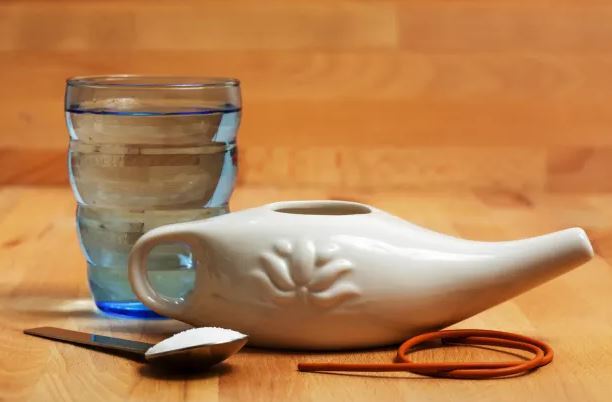If you want to give it a try, be sure to avoid these common mistakes.
By EMILY LAURENCE - DEC 28, 2022
Are Sinus Rinses Safe? The Biggest Dangers - Parade: Entertainment, Recipes, Health, Life, Holidays

Waking up to find that you can only breathe through your mouth is never fun. Colds and sinus issues can cause a stuffy nose, throbbing headache and even cause swelling. The combination can make it difficult to focus on anything else until you figure out how the heck to unclog your nostrils.
Maybe you’ve considered doing a sinus rinse (also called a nasal rinse) for relief. You’ve heard of other people using a neti pot or bulb syringe. Could it work for you? Before you give it a try, it’s important to know exactly how to do it and what common mistakes to avoid.
What Is a Sinus Rinse and When Can It Be Helpful to Do One?
Primary care physician Dr. Jeffrey S. Gold, MD, says that he often sees patients with seasonal allergies, chronic allergic rhinitis, as well as acute or chronic sinusitis—all conditions that can lead to feeling all stuffed up and dealing with a runny nose. “A sinus rinse can be really beneficial for keeping the mucosal lining of the nasal passage lubricated,” he says. He explains that the drier the inside of the nose is, the more mucosal breakdown there is and the more irritation there can be. This, he says, makes it more likely to get viruses and bacterial infections.
Ear, nose and throat doctor Dr. Sayani Niyogi, DO, says that sinus rinses use salt water or saline to wash the nasal cavities, which is done using a neti pot (a small, plastic teapot), syringe or squeeze bottle. “Nasal rinsing is a way of irrigating your sinus passages to remove and help loosen nasal mucus, but also remove pollen, dust, bacteria or other debris that may be irritating the sinus passages,” says Dr. Barbara Bawer, MD, a family medicine physician at The Ohio State University Wexner Medical Center.
All three doctors say that doing a sinus rinse can be helpful, but the key is making sure you’re doing it correctly.
How to Do a Sinus Rinse Safely—and Common Mistakes to Avoid
Dr. Bawer says that there’s one common mistake people make when doing a sinus rinse: using tap water. This is a big no-no. “You should use sterile, boiled or distilled water for any nasal rinses, not tap water. Boiled water needs to be cooled to lukewarm water before use to avoid burning yourself,” she says. Dr. Niyogi also emphasizes the importance of not using tap water. “I have many patients asking me if using a sinus rinse can lead to infections. The main mistake some people make is not using clean water for irrigation,” she says.
Once you have the appropriate water ready, Dr. Bawer says to wash and dry your hands. Then, lean over the sink and tilt your head sideways to the point that your forehead and chin are aligned to stop the water from getting into your mouth. “Pour the water into the device. Using the spout that typically comes with these rinsing devices, you want to insert it into the upper nostril. When tilting your head and breathing through your mouth, pour the water into the nostril until it comes out of the other or lower nostril,” Dr. Bawer instructs. “Once done, clear your nostril. You can even blow your nose after.” She says to repeat this by tilting the other direction and pouring the fluid into the other nostril.
Dr. Bawer says that another mistake people make is not cleaning their devices when they’re done. She says it’s important to clean it inside and out and then let it completely dry before putting it away.
If the idea of a sinus rinse completely grosses you out or you want to try something else for sinus relief, there are other routes to take. Dr. Gold says that sitting in the bathroom with the shower’s hot water on (creating a steam room) can be helpful—even more so if you use a eucalyptus essential oil or spray. He also says that over-the-counter non-sedative antihistamines can also be helpful as can over-the-counter decongestants.
“If the rinse isn’t quite doing the trick, make an appointment with your local ENT doc who can use a little camera to see if there’s any blockage in the nose that could be preventing the irrigation from working properly,” Dr. Niyogi says. “They can also do allergy testing or prescribe the use of topical and oral medications to decongest the nose, on an acute or chronic basis.”
Dr. Bawer says that using a chest rub with menthols, like Vick’s vapor rub, humidifiers and essential oils can provide some relief too. “If allergies are an issue, then an over-the-counter antihistamine can be helpful, or, sometimes prescription nasal steroid sprays are needed or other nasal sprays,” she adds.
The big takeaway? If you're dealing with sinus issues, you don’t have to suffer. There are different solutions out there that can help so you aren’t doomed to mouth-breathe. Given their success, these solutions are certainly ones to nose, er, know!
Sources
- Dr. Jeffrey S. Gold, MD, primary care physician
- Dr. Sayani Niyogi, DO, ear, nose, and throat doctor
- Dr. Barbara Bawer, MD, a family medicine physician at The Ohio State University Wexner Medical Center
Find an ENT & Allergy Associates Doctor Near You, or Explore More Blog Topics
